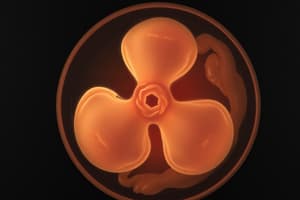Podcast
Questions and Answers
What structure is formed from the thickened cranial end of the primitive streak?
What structure is formed from the thickened cranial end of the primitive streak?
- Definitive notochord
- Notochordal plate
- Primitive node (correct)
- Notochordal canal
Which transcription factors are essential for head formation during the establishment of the body axes?
Which transcription factors are essential for head formation during the establishment of the body axes?
- LIM1, HESX1, cerberus (correct)
- Chordin, FGF, HNF-3β
- HNF-3β, BMP-4, OTX2
- Nodal, Goosecoid, noggin
What genetic factor is responsible for maintaining the primitive streak?
What genetic factor is responsible for maintaining the primitive streak?
- BMP-4
- Nodal (correct)
- Chordin
- HNF-3β
Which gene product antagonizes the activity of BMP-4 to allow for the dorsalization of cranial mesoderm?
Which gene product antagonizes the activity of BMP-4 to allow for the dorsalization of cranial mesoderm?
Which of the following mesodermal contributions is NOT a result of BMP-4's action?
Which of the following mesodermal contributions is NOT a result of BMP-4's action?
What happens to embryos that lack HNF-3β?
What happens to embryos that lack HNF-3β?
Which member of the TGF-β family is secreted throughout the embryonic disc and influences ventral mesoderm formation?
Which member of the TGF-β family is secreted throughout the embryonic disc and influences ventral mesoderm formation?
What structure ultimately forms from the notochordal plate during development?
What structure ultimately forms from the notochordal plate during development?
What is the primary purpose of gastrulation during the third week of development?
What is the primary purpose of gastrulation during the third week of development?
What happens to the cells of the epiblast during gastrulation?
What happens to the cells of the epiblast during gastrulation?
Which structure is formed by the first cells migrating through the primitive node in a cephalic direction?
Which structure is formed by the first cells migrating through the primitive node in a cephalic direction?
What does the notochord influence during embryonic development?
What does the notochord influence during embryonic development?
What genetic factor is directly involved in head development and its malformations?
What genetic factor is directly involved in head development and its malformations?
What consequence arises from the absence of the Brachyury (T) gene?
What consequence arises from the absence of the Brachyury (T) gene?
During gastrulation, how do cells establish contact with the extraembryonic mesoderm?
During gastrulation, how do cells establish contact with the extraembryonic mesoderm?
In a 15-16 day embryo, which aspect characterizes the primitive streak?
In a 15-16 day embryo, which aspect characterizes the primitive streak?
How does FGF-8 influence left-sided gene expression in an embryo?
How does FGF-8 influence left-sided gene expression in an embryo?
Which gene acts as a repressor of left-sided gene expression on the right side?
Which gene acts as a repressor of left-sided gene expression on the right side?
What role does the buccopharyngeal membrane play during development?
What role does the buccopharyngeal membrane play during development?
What is formed as a result of cells detaching from the epiblast and migrating beneath it?
What is formed as a result of cells detaching from the epiblast and migrating beneath it?
Which mesoderm is formed by cells that migrate through the more caudal part of the primitive streak?
Which mesoderm is formed by cells that migrate through the more caudal part of the primitive streak?
Which transcription factor is restricted to the right lateral plate mesoderm?
Which transcription factor is restricted to the right lateral plate mesoderm?
What is the consequence of Goosecoid overexpression or underexpression?
What is the consequence of Goosecoid overexpression or underexpression?
What happens to the morphology of the embryonic disc as development progresses?
What happens to the morphology of the embryonic disc as development progresses?
What region of the embryo mainly experiences expansion during development?
What region of the embryo mainly experiences expansion during development?
At what point in development do the germ layers in the cephalic part begin their specific differentiation?
At what point in development do the germ layers in the cephalic part begin their specific differentiation?
What is a characteristic feature of holoprosencephaly?
What is a characteristic feature of holoprosencephaly?
What condition is associated with insufficient mesoderm formation in the caudal-most region of the embryo?
What condition is associated with insufficient mesoderm formation in the caudal-most region of the embryo?
What anomaly refers to the transposition of organs in the thorax and abdomen?
What anomaly refers to the transposition of organs in the thorax and abdomen?
Which of the following is NOT a feature associated with caudal dysgenesis?
Which of the following is NOT a feature associated with caudal dysgenesis?
What is a potential result of remnants of the primitive streak?
What is a potential result of remnants of the primitive streak?
What syndrome is characterized by abnormal cilia leading to bronchiectasis and chronic sinusitis in patients with complete situs inversus?
What syndrome is characterized by abnormal cilia leading to bronchiectasis and chronic sinusitis in patients with complete situs inversus?
Flashcards are hidden until you start studying
Study Notes
Gastrulation
- Key process during the third week of embryonic development that establishes the three primary germ layers: ectoderm, mesoderm, and endoderm.
- Begins with the formation of the primitive streak on the epiblast's surface, starting as an ill-defined structure.
- By 15-16 days, the primitive streak appears as a narrow groove, with a primitive node at its cephalic end surrounded by a primitive pit.
- Epiblast cells migrate toward the primitive streak, transform into flask-shaped cells, and detach to form endoderm and mesoderm; those remaining become ectoderm.
- As cells migrate, they spread laterally and cranially, establishing contact with extraembryonic mesoderm covering the yolk sac and amnion.
Formation of the Notochord
- The cranial end of the primitive streak thickens to form the primitive node, with a central depression known as the primitive pit.
- Cells from the node multiply and migrate cranially, forming the notochordal canal which later flattens to create the definitive notochord.
Establishment of Body Axes
- Establishes anteroposterior, dorsoventral, and left-right axes during gastrulation.
- Anterior visceral endoderm (AVE) expresses essential head formation genes such as OTX2, LIM1, HESX1, and cerberus.
- Nodal gene expression initiates and maintains the primitive streak, leading to mesoderm differentiation.
- BMP-4 and FGF signaling in the embryonic disc contribute to mesoderm ventralization, affecting kidney, blood, and body wall development.
- Chordin, noggin, and follistatin inhibit BMP-4, leading to dorsalization of cranial mesoderm into notochord and somites.
- HNF-3β is crucial for node maintenance and induces regional specificity in the forebrain and midbrain; its absence leads to improper gastrulation and brain structure development.
- The Brachyury (T) gene regulates formation of mesoderm and embryonic axis; its deficiency can result in caudal dysgenesis.
Fate Map Established During Gastrulation
- Mapping of epiblast cell fates based on lateral migration through the primitive streak.
- Cranial region cells become notochord; lateral edge cells become paraxial mesoderm; mid-streak region cells form intermediate mesoderm; caudal cells contribute to lateral plate mesoderm and extraembryonic mesoderm.
Growth of the Embryonic Disc
- The embryonic disc starts as a flat structure but elongates, particularly at the cephalic end.
- Cell migration from the primitive streak continues until the end of the fourth week, with germ layer differentiation beginning in the cranial region during the third week and in the caudal region by the end of the fourth week.
Clinical Correlates of Gastrulation
- Holoprosencephaly: Midline deficiency in craniofacial structures due to teratogenic effects of substances like alcohol, resulting in a small forebrain and merged lateral ventricles (hypotelorism).
- Caudal Dysgenesis (Sirenomelia): Insufficient mesoderm in the caudal region leads to defects affecting lower limbs and urogenital structures, including vertebral abnormalities and renal agenesis.
- Situs Inversus: Transposition of thoracic and abdominal viscera; often associated with bronchiectasis and chronic sinusitis due to abnormal ciliary action (Kartagener syndrome).
- Sacrococcygeal Teratoma: Arises from remnants of the primitive streak, representing an abnormal growth of tissue in the sacrococcygeal region.
Studying That Suits You
Use AI to generate personalized quizzes and flashcards to suit your learning preferences.




